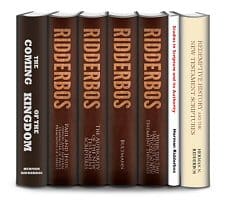Between Logos and Vyrso, we currently offer more than 26,000 resources. Some titles flit across my radar, while others encourage me to look more closely. Occasionally, though, I come across a resource that I get really excited about. The nine-volume Herman Ridderbos Collection falls into the latter category.
I spent a couple of years preaching through the gospel of John, and Ridderbos’ The Gospel of John: A Theological Commentary became one of my favorite resources for preparation. I loved it so much that I purchased and consumed Paul: An Outline of His Theology. Soon I was scouring used bookstores and shopping online for more of Ridderbos’ works.
Here’s a few Ridderbos gems:
“The ransom that Christ had to pay for the ‘many’ was nothing less than his being delivered up to God’s judgment in the place of ‘the many.’ In this sacrifice Jesus suffered in anticipation, as it were, all that those who are his would have had to endure according to the law on account of their sins. But in it he also gave them the guarantee of their perfect redemption. He opened the gates of paradise (Luke 23:43), gave them assurance of the kingdom (Luke 22:29, 30); in short, he laid the judicial foundation of the entire preaching of the gospel.”
“The dominant clue for all interpretation of Scripture is thus Christ, not man; it is man sub specie Christi and not the reverse.”
“Without the New Testament the Old is but a torso; and the New Testament dangles in mid-air, as it were, if one does not see its foundations in the Old. Nevertheless, it is in the New Testament that what is symbolically contained in the Old achieves its full explication and fulfillment.”
“In Jesus’ apocalyptic preaching the human being is not only referred to the future for salvation, but also to the presence of the grace of God, to the freedom and the calling to live out of this new beginning as a child of God.”
“John the Baptist’s preaching was so ominous and alarming because he said that the ‘axe was laid unto the root of the trees,’ and that he who was coming held ‘the fan in his hand.’ Now it appears that with Jesus’ coming, on the one hand, the fulfillment has become a fact, but, on the other, that the time of grace has also been extended. This extension is important, but the preaching of grace is no less important. The gospel itself now operates with an entirely new force, and an intensified content; it is the preaching of the fulfillment; it is the message of the grace of God revealed in Christ which now starts its course in this world.”
One of my favorite features of Ridderbos’ theology is his emphasis on heilsgeschichte, or God’s hand in the Old Testament narrative, a story of salvation culminating in Christ—the center point of redemption. My exposure to Ridderbos has encouraged me to pay closer attention to the salvific thread running through the Scriptures.
If you’re looking for solid material from a modern theologian, look no farther than the Herman Ridderbos Collection.





